For several sound reasons, political as well as economic, the purchase of a new car in this new environment is arguably a very bad idea.
For more on that, see here.
For several equally – and corollary – sound reasons, now is an excellent time to buy an old car and even better, an old truck – as friends of mine just did.
Their choice – a mid-1990s full-size Dodge Ram truck with a mechanically injected Cummins turbodiesel straight six – was perhaps the best possible choice. First, because it is a truck and so capable of performing work in addition to mere transportation. Being able to haul – and pull – in addition to carrying are virtues cars lack. 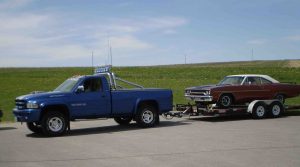
Second, because it is a truck and so capable of traversing roads and dealing with conditions that cars aren’t built to handle. In the Third World future that appears to be intended, roads may become impassable due to lack of repair; this is already becoming a problem in many areas and is likely to get worse as the tax cows stop giving milk and the takers of the “milk” use the proceeds for their own needs.
A truck will not only enable you to get home – and to wherever you need to go – it makes it feasible to make a home where it is difficult if not impossible for those without a truck to go. A less-accessible home is a safer home, ipso facto. It may also make it a less expensive home in that a hard-to-reach home is harder to sell to the city people currently fleeing the civilizational devastation imposed by the policies most of them supported.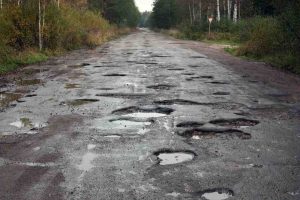
The farther you can get away from them – and out of their reach – the better.
Fourth, a truck is strong. It will have a heavy steel frame built out of literal steel girders that you can attach cables and winches and hooks to and which can take a load without bending. Steel frames are also much easier to fix in the field if that ever becomes necessary. A steel frame can be pulled back into shape with a come-along and a big tree; sections can be cut and welded if they rust.
And it takes a long time for rust to become a structural issue with a steel frame, because of the thickness of the steel itself.
Unibody cars are also generally made of steel but it is of thinner gauge – to save weight, the main reason for cars no longer being built with separate steel frames onto which the body is mounted – and so it rusts through more quickly and because the whole car is literally welded together it is more difficult to repair when damaged and also more susceptible to crippling damage from relatively minor impacts. A deer strike that might dimple a truck’s fender (that can be pulled back into shape or unbolted and replaced with a new one) might total a car – or at least, damage it sufficiently as to render it unusable.
Trucks also have bumpers made of steel – not “covers” made of plastic. Bumpers can be bumped. And used to bump things. A bumper can serve to part the peacefully protesting seas far more effectively than a plastic “cover.”
Plastic “covers” are easily torn off – as they are flimsy to start with and held in place by a handful of plastic clips. The “cover” may also include plastic headlights, also easily damaged and hard to replace when the store’s not open. Old trucks like the one my friends bought have glass headlights, easily replaced and much more sturdy. Buy a spare set now, for later – and the truck will have headlights for the next 20 years, which should be long enough to last through the “great reset.”
An old truck can do other things, equally important.
Among these things is are the things it can do without, such as electricity. A mechanically injected diesel-powered truck will start if it has a manual transmission – and you have a hill. Even if you haven’t got a battery.
Or an alternator.
It does not require electricity to run – unlike a modern electronically injected diesel, which will neither start nor run without a battery and a working alternator to fire the injectors and run the computer. The old mechanical-injection diesels require fuel – and compression, which can be applied mechanically by using the rolling tires to start the engine. Once running, it runs as long as there is fuel.
And if it has a working alternator, it makes electricity – which not only powers the truck’s accessories it can be used to power yours, in a pinch. Get an inverter – and you have power.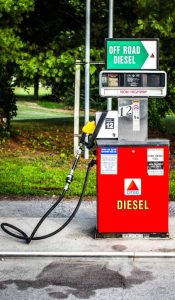
You also don’t have particulate traps or need DEF – diesel exhaust fluid, which all modern electronically injected diesels require and which may not be available a few months from now.
An older, mechanically injected diesel such as the one my friends just bought can also burn almost any fuel – including fuel you can make (e.g., home-brew diesel, waste vegetable oil) whereas a modern electronically injected diesel engine requires fuel you have to buy that must be refined – Ultra Low Sulfur Diesel. Even if available – and who knows for how much longer – ULSD pump diesel is expensive diesel.
Also less lubricious diesel.
One of the great advantages of diesel engines – their longevity – is being dialed back by the use of fuel that does not lubricate as it burns, to the extent that it did when diesel was just diesel and not the “low sulfur” variety.
You can pump “off-road” diesel – which has the sulfur – into your older diesel, too. Provided you don’t pump it at the pump. It’s illegal (all sensible, economical things being made illegal so as to make not-sensible and expensive things unavoidable) and the station owner can get into trouble if anyone sees you doing it and narcs the station out to the local government apparat.
The way around this is to innocently pump “off-road” diesel into jugs in the bed; then pour them into your truck’s tank at home. But do this a few jugs at a time – and keep it on the down low.
My friends made a wise choice – and not just functionally. If you’ve been watching the market for used trucks – especially older trucks with mechanically injected diesels – you are already aware that they sell fast and at remarkable prices. These prices are only going to up as things get worse and the truck you buy now could be worth its weight in gold six months from now . . . when a bedfull of paper dollars isn’t worth anything at all.
. . .
Got a question about cars, Libertarian politics – or anything else? Click on the “ask Eric” link and send ’em in!
If you like what you’ve found here please consider supporting EPautos.
We depend on you to keep the wheels turning!
Our donate button is here.
If you prefer not to use PayPal, our mailing address is:
EPautos
721 Hummingbird Lane SE
Copper Hill, VA 24079
PS: Get an EPautos magnet or sticker or coaster in return for a $20 or more one-time donation or a $10 or more monthly recurring donation. (Please be sure to tell us you want a magnet or sticker or coaster – and also, provide an address, so we know where to mail the thing!)
My latest eBook is also available for your favorite price – free! Click here. If that fails, email me at EPeters952@yahoo.com and I will send you a copy directly!


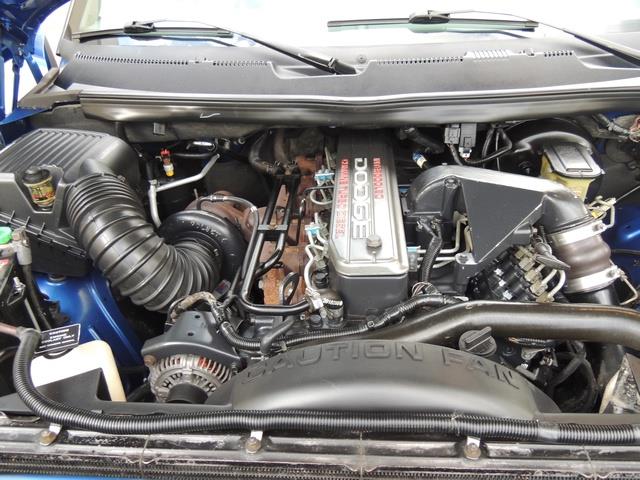





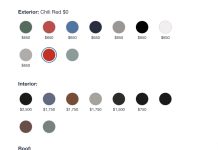



I have an old 1971 F250 truck too. I’ve had it since 1979 when I bought it used. It has a gasoline engine with a propane mixer above the carb. It can run on either gasoline or propane, but runs smoother on propane but more powerfully on gasoline. I’ve given some thought to selling it because I have a much newer diesel truck. Old Blue never gets any miles anymore and the registration and insurance have lapsed. It will still start instantly, but the tires are pushing 15 years old and I don’t trust them anymore. Should I buy some more tires and keep it in reserve, or cash it in and buy some other toys.
All I have are old trucks!
Unfortunately, none of them are old diesels.
I regret having killed my first car, A diesel powered ’74 Peugeot 504, with frequent use of starter fluid. I was young and impatient about the glow-plugs. 🙁 I’d love to still have that car.
A couple of years ago I wrote in and asked for advice about what to do with my running-but-rusting ’95 12 valve. Your advice at the time was to hang on to it… and I’m happy to report that I did. A full body restoration later, it’s a real head-turner and I often get comments from guys who are in the know offering to buy it, haha. Of course I never will!
Excellent, Sean!
A solid truck is almost as good as an AR – and might end up being more useful…
OK. For us girls who love trucks, but are not hip to all the lingo – What is an AR?
Hi Bonnie,
“What is an AR?”
A tyrant/criminal repellent device, a legitimate tool for self defense, slandered as merely an offensive weapon, distinguished, in law, by it’s appearance, not capacity, the bane of liberal control freaks, the hope for a free society.
Cheers,
Jeremy
Hi Bonnie,
AR = armalite rifle…AR-15!
IMO, an old cargo van is better than an old pickup due to its inclusiveness and greater adaptation to housing.
Should be 40+ yrs,not yesterdays.I hate spell check!
If installing a fuel psi gage make sure the reading is from the clean side of the secondary filter,otherwise with normal filter restriction as it gets dirty you won’t see the injection pump starting to starve for fuel.It isn’t the electronics thatnfail with low pressure,it’s a timing plunger that self destructs shown by the fault code for can’t reach commanded timing. Later Cummins Recon pumps have a redesigned plunger that holds up much better.Converting to a 7100 is a lot more involved than just changing pumps.Drive gear,gear housing,camshaft(bolted nose for harmonics),lift pump,custom made hi psi lines to connect pump to 4 valve head are just some things off the top of my head.I have been working for Cummins the last 40+ yesterday and some of the misinformation out there is staggering.
The 6BT 12 valve Cummins is a great engine. But don’t overlook the 2nd Generation trucks with the 24 Valve- it’s an even better engine, but it does have the less reliable VP44 injection pump. This has some electronics in it- the engine will run without the electronics, but not come up to speed. However- it is easily swappable to the Bosch P7100 mechanical injection pump which is plentiful and fairly cheap- giving a great product improved mechanical diesel. I’ve owned both- with reasonable care and maintenance they will easily run 400k miles. My 2001 gets 30MPG if I drive slowly, or will go as fast as I want to go if I’m willing to tolerate 14.5MPG.
If you do run the VP44 injection pump, make sure to run a fuel pressure gage- the loss of fuel pressure takes away the cooling to the electronics (fuel flow carries the heat away) as the electric lift pump is the real culprit in most VP44 failures.
Back in the 80s, my folks had a diesel VW Jetta with a 5 speed stick.
That car probably got an honest 50 mpg. They had to plug it in at night on chilly nights, but that car lasted 11 years…no mean feat for an early 1980s car.
They also had an oil furnace/water heater with two 500-gallon underground tanks and an above ground 250 gallon tank. They mounted the tank near the garage, put a hand crank pump on it, and filled it and the underground tanks with #2 fuel oil for the furnace, water heater, and car.
They lived in a semi-rural area, so no one was the wiser…I don’t think that would fly today. But they were able to ride out gas shortages and high prices.
One thing about the Dodges with B’s(which is the Cummins family) is Chrysler has poor to none primary filtering with water seperation.Install a quality,Racor or Fleetguard,filter seperator to protect the lift and injection pumps and always keep a couple of these filters on the truck with the tools to replace it to prevent being stranded at a bad time.
I had a 1994 Dodge RAM 3500 diesel that I pulled my 5th wheel with. Great truck and I nearly cried when I had to sell it. However, the 89 to 2002 – 5.9 had a dangerous issue, the killer dowel pin. If you buy one of these trucks fix that issue before you drive it and it’s cheap. Don’t fix it and it can cause indigestion.
http://www.trucktrend.com/how-to/engine/what-is-killer-dowel-pin/
At the very least read about it so you are aware of the problem. Mine came loose at about 110,000 miles and that’s how I learned about it, the hard way. Even at that I got lucky as the dowel pin just cracked the aluminum timing gear cover and fell down into the crank shaft and didn’t get ground up in the gears. Otherwise I loved that truck especially when turbo kicked in and I passed anything on the road.
Hat tip for the tip, Chip!
It’s a near-truism that practically every engine has a weak point. My beloved Pontiacs need a dry sump oil pan if you intend to road race ’em (or even race ’em on the road).
But it’s the overall solidity that sells!
Eric,
Love this article. I bought a Dodge truck with a 12 valve Cummins a few years ago for a SHTF scenario. It will start with a hill and a zip tie to hold the fuel shut off open. It’s a 4×4 (vacuum actuated so it needs no 12 volts to engage) so it will go almost anywhere. I bought the truck in Texas, so it has no rust. As long as I keep it off the road in the winter (I’m in MN) this truck should last forever. I rebuilt the entire truck so it should easily go 200k without too much input. I’m on a farm about 35 miles from the city so hopefully far enough out so the marauding hoards don’t get here when the grid goes down.
Thanks, Markus – and congrats on your find!
What’s your take on the VW TDI Diesel’s life span? Mine’s 10 years old has 65K miles and no problems except played out AC.
Hi RC,
VW has been building diesels for a long time and is arguably among the best at building them. Your 65k VW is hardly broken in. You ought to be able to put another 200,000-plus on it before anything major requires attention. These are great vehicles. Hang on to yours!
Thanks! That’s why I bought it.
There are also conversions to a mechanical injection system available if you want to be ready for a SHTF scenario. The TDIs are also a bit sensitive to fuel quality so they aren’t perfect if you want to fill up in the middle of nowhere with something less than perfect low sulfur diesel fuel.
Thanks. And speaking of less than perfect fuel I almost filled it once with gas. The station I stopped at had reversed the colors so the yellow pump I instinctively reached for was gas not diesel. It happened in Florida. Made me wonder if it wasn’t an accident. Probably had a deal with a local tow outfit and a shop that flushes out tanks. Fortunately I noticed just as I was sticking it in. Florida….what can you say??
Except for the color, that’s my truck! A 1995 regular cab with the old 12-valve mechanically-injected Cummins that I bought new for around $25k. The only thing that’s electric on it is the fuel shutoff (and wouldn’t you know: that has caused trouble).
I’ve had lots of inquiries from people wanting to buy it even before the 2020 insanity began. As George Bush the less-dumb would have said, “Nah gah daht!”
I agree with what you said, though I think your timeline is a bit pessimistic. DEF and the new diesel aren’t going to simply disappear in six months. Not as long as there are still diesel trucks on the road. Right now electric semis are what computer people call vaporware. Even if they built a working one tomorrow, it would still take years to turn the current fleet over. I get the point, but I think it’s more like a couple of years rather than a few months.
I agree, Jim – which is why the best time to act is before the knowledge of what’s imminent becomes common. After that, it’s too late…
But Eric, what are the contact tracers and multipass checkers going to do if you are not nearby and available?
Hi Torinom,
Exactly. Make it as inconvenient for them as possible. Maybe they’ll just give up.
I’ve been looking for a old chevy with the Detroit diesel in it. No turbo for even more mad max era reliability. As you have said though, the prices are becoming insane.
I want the 285 dollar lunch in downtown Tokyo.
How I learned to stop worrying and love the mask.
Plenty of strangeloves practicing their skullduggery anyway they want it. Good for them.
The chickens will come home to roost one day, some day.
Plenty of old pickups and farm trucks out there, 67 pages of them.
Anything with a diesel engine is higher priced.
If you want a purdy good old farm truck from 1970, those are out there too for three grand to six grand. 50 gallon fuel tanks might scare you off, especially if there are two of them. Good for fuel storage, just have it on the premises, maybe drive it a mile or two per week, good sized grain box and a flatbed will haul plenty with no problem.
A Dodge D500 1970 for sale for 4500 dollars. Plenty of ads like that out there in the hinterlands, you just gotta go get one. Going to cost a couple of hundred to drive it home.
The old pickups are easier to obtain and drive away and they are out there too by the truckload.
Exactly what I am going to eventually achieve, the buying of some old truck out there.
“If you’ve been watching the market for used trucks – especially older trucks with mechanically injected diesels – you are already aware that they sell fast and at remarkable prices. These prices are only going to up as things get worse…”
Well, that’s the problem right there, isn’t it? There’s only so many used trucks out there, and the decent ones — and very often the beat-to-death ones — are commanding stupid money.
Vehicles don’t last forever, particularly in the North where they rot out — sometimes BADLY — in 10-12 years. The solution is not for all of us to go out and buy used, because there’s not enough good used vehicles to satisfy the demand. The solution is to end the government BS that is killing the market for simple, affordable, new vehicles.
I would agree wholeheartedly. The proper solution isn’t to address symptoms as they appear but to attack the infection. Do that, and the symptoms take care of themselves.
“The solution is not for all of us to go out and buy used, because there’s not enough good used vehicles to satisfy the demand. The solution is to end the government BS that is killing the market for simple, affordable, new vehicles.” — X
Agreed. Buying a used truck is not a solution to the problem of government regulation, it’s just a workaround, or a prep. But with the likelihood of reforming government regulation being pretty much zero, it’s good to talk about workarounds and preps.
I think we’ve covered this before, but tell your friend to get a 275 gallon home heating oil tank (they’re a couple hundred bucks), and have local home fuel oil dealer fill it as needed. Use that, pretty much the same stuff as the old diesel fuel, and usually a lot cheaper too. The usual caveat tho, keep it to yourself and don’t get caught!
Get some fuel dye if you can. Heating oil, which is usually #2 diesel anyway, is dyed RED, as is diesel that isn’t taxed for off-road vehicles. Diesel for registered/licensed vehicles is dyed GREEN. IF the cops pull over your vehicle, they can inspect the tanks contents if they’re willing to take the time to pull a sample…which typically isn’t bothered with for an ordinary pickup or a Benz or VW “Wabbit” oil-burner. But IF you get caught, the fines are pretty stiff.
A buddy of mine does that, has an oil burning furnace anyway so he added a tee to the out line and a small pump to get it up from the basement to his car, an old (pre-gimped) VW. Explains summer deliveries by the oil burner also being the water heater. Now I’m wishing I kept my old tank when we switched to gas heat years ago, though it did free up a ton of space for my basement workshop.
Great advice Eric.
Re: off road diesel: I have an insulated work shop that I heat with an old whole house oil-fired hot air unit. I chose this method because I only work in the shop an hour or two at a time, and in the NE it can get cold.
So this heater warms up the place almost instantly. And I put the controls on a timer because I have forgotten to turn it off many times and heated the place for days when I didn’t need to.
However, the nice thing I also have is an old re-purposed 275gal oil tank for this heater. They are avail. almost free from the tons of people converting from oil to gas. Same with heater, they are normally free from these same conversions. I only need to fill it once a year or so.
This oil tank also became my farms fuel tank for my few diesel farm machines I have vs the Pita of 5 gal. cans which I did for too long.
Just a thought for people that want fuel storage.
To find, just start asking local HVAC Contractors that do these conversions, and you’ll find them easy. I did just this and made a simple deal. him: ‘If you hire my guys (extra work over the weekend for them) to install the heater and tank in your barn, I’ll give you the heater and tank for free”. Easy money to spend for the result.
Lacking an electrical ignition system, such diesels need far less in maintenance as well. Change the filters and the oil and that’s essentially it. Injectors and pumps last indefinitely. I’ve got a 1961 880 David Brown diesel tractor I’ve had for 30 years that has received no other engine maintenance than that listed above. Still runs great. Although it has a transmission case leak that leaks when it’s idle. Which means every time I put it to work I have to refill the transmission. All five gallons of it. Which I recycle from the leak, adding a quart or two.